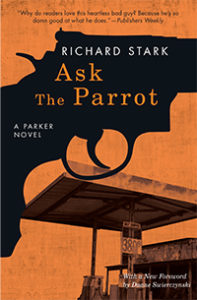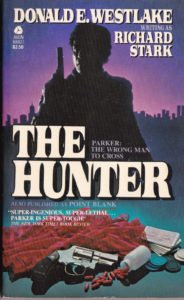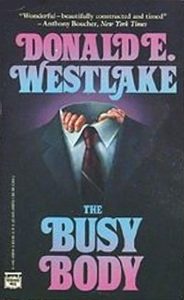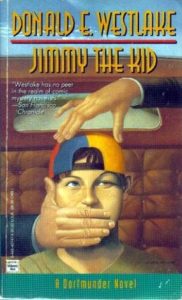There’s no way to sum up the brilliance of Donald E. Westlake in a few measly paragraphs but we might as well try. He was the consummate writer, never without a story, always with a new idea bubbling up in some active corner of his mind and with the craft to tell the thing the way it wanted to be told. With the Parker series, still adored by readers the world over, he wrote the hardest of hardboiled noirs, all chiseled prose, diamond-cut dialogue, and abrupt cuts, an aesthetic statement if ever there were one. With John Dortmunder he explored the more eccentric sides of crime, the screw-ups and schemers whose plans usually went sideways and who never left home without burglar tools and a few wisecracks for anyone who questioned their chosen vocation. Besides the crime novels there were sci-fi epics, screenplays (most notably, 1991’s The Grifters, for which he won an Oscar), spy novels, tales of adventure, short stories aplenty, all the many forms of popular literature that dominated the second half of the twentieth century. He was prolific beyond belief and yet a craftsman to the end, earning himself a devoted following (though perhaps not quite so large as others) and a reputation as someone who was constitutionally unable to write an uninteresting sentence. (His following remains largely intact today: check out the excellent website dedicated to his work and legacy, or read the appreciations right here at CrimeReads, mostly from Levi Stahl, who’s also edited an anthology of Westlake’s nonfiction writing. There are also “new” novels from Westlake still being unearthed and released to this day.)
Whichever name he was writing under (and there were many names), in whichever series or style, Westlake’s work was distinctly his and never lacking in momentum, the kind that keeps you reading straight through to the end and leaves you eager for the next volume to start. He was born on July 12, 1933 in Brooklyn, New York, and died on New Year’s Eve just over ten years ago now. Many of us are still working through his books, still discovering new gems in the long bibliography and archive he left behind.
He wrote so often, so well, and in so many styles, there’s hardly a subject out there he didn’t touch on in one way or another. For his birthday, we decided to round up twenty-five of the very best of those lines, the way we like to do when an iconic crime writer’s birthday rolls around, and break them down according to a few handy topics covering life, literature, and inspiration in its many varieties. Enjoy the Westlake, and go searching for more. You’re sure to find them.
__________________________________
The Quotable Donald E. Westlake
__________________________________
Life (Properly Understood)
“Nobody gets everything in this life. You decide your priorities and you make your choices. I’d decided long ago that any cake I had would be eaten.”
— Two Much (1975)
“Life is a slow-motion avalanche, and none of us are steering.”
— BlogCritics interview (2007)
“Real life. The greatest interactive fiction of them all.”
― Drowned Hopes (1999)
Faith (Varieties of)
“In order to hold your faith intact be sure it’s kept unsullied by fact.”
— Don’t Ask (1993)
“If Chester had a failing, it was that he believed people were what they thought they were.”
— The Hunter (1962)
“Like the residents of Brigadoon, the people in the church drifted in a long and dreamless sleep, freed of struggle and expectation.”
― Drowned Hopes (1990)
Writing (Craft)
“In the most basic way, writers are defined not by the stories they tell, or their politics, or their gender, or their race, but by the words they use. Writing begins with language, and it is in that initial choosing, as one sifts through the wayward lushness of our wonderful mongrel English, that choice of vocabulary and grammar and tone, the selection on the palette, that determines who’s sitting at that desk. Language creates the writer’s attitude toward the particular story he’s decided to tell.”
“Writing is flat, so if you only have part of one eye working, you still can do the job. It’s just that you sit there and you’re angry, which doesn’t help.”
“(Novelists, when their characters drive cars, never feel compelled to describe precisely what the physical actions are of hands, feet, eyes, knees, elbows. Yet many of these same novelists, when their characters copulate, get into such detailed physical description you’d think they were writing an exercise book. We all know the interrelation between the right ankle and the accelerator when driving a car, and we needn’t be told.”
― Dancing Aztecs (1976)
There’s Nothing Like a Good, Noir One-Liner
“What did Jesus Christ say to the Teamsters? ‘Do nothing till I get back.'”
— Walking Around Money (2005)
“The August sun, God’s blood-blister…”
— Watch Your Back (2006)
“If he were any more crooked, you could open wine bottles with him.”
― What’s So Funny? (2007)
“That’s a geometric figure, that bird, he don’t exist without an angle.”
― The Hot Rock (1970)
“You’re too cheap. You’d make me nervous to work for you. I’d come to you for a gun, you wouldn’t want to give me more than one bullet.”
― The Hot Rock (1970)
“Eyes wide and blank as the buttons on a first Communion coat.”
— Ask the Parrot (2006)
“I sat up and the room was full of a man with a gun.”
― Somebody Owes Me Money (1969)
“[The regulars were] huddled together at the left end of the bar, as silent and miserable as kittens in a sack with the bridge getting close.”
― Watch Your Back! (2005)
“Probably nobody ever jogs toward the room where they will write their suicide note.”
― Dancing Aztecs (1976)
Relationships
“Bobbi doubted there was ever much future for a couple who had nothing in common except heterosexuality.”
― Dancing Aztecs (1976)
Grace Under Pressure
“The cops are after me, I’m on my way to join an organization of lunatics and bombers, I’m wired for sound, my necktie turns into a smokescreen, my handkerchief will make you throw up, my Diner’s Club card explodes, I’m the leader of a subversive terrorist organization composed entirely of undercover federal agents, newspapers all over the country are saying I killed my girl, and I’m on my way to meet a twenty-five-year-old Nazi built like Bronco Nagurski. If relaxed means limp, don’t worry about it. I’m relaxed. I’m relaxed all over.”
— The Spy in the Ointment (1966)
His Beloved Publishing Industry
“Publishing is the only industry I can think of where most of the employees spend most of their time stating with great self-assurance that they don’t know how to do their jobs. “I don’t know how to sell this,” they explain, frowning, as though it’s your fault. “I don’t know how to package this. I don’t know what the market is for this book. I don’t know how we’re going to draw attention to this.” In most occupations, people try to hide their incompetence; only in publishing is it flaunted as though it were the chief qualification for the job.”
“If it weren’t for received ideas, the publishing industry wouldn’t have any ideas at all.”
Finding Inspiration
“I believe my subject is bewilderment. But I could be wrong.”
“Those four guys in the late 60’s who attacked a jewel merchant on New York’s West 46th St. on the sidewalk, so they could steal his jewel-filled station wagon, which they abandoned 2 blocks later because none of them could drive a stick shift. Where would I be without such people?”
“I make a note, set it aside, and hope it makes sense when the time comes to look at it again.”
“When Stark isn’t off sulking somewhere, or whatever he’s doing when he won’t return my calls, I alternate between the two. That usually works well, though occasionally an idea for the wrong guy drifts through my mind.”


























